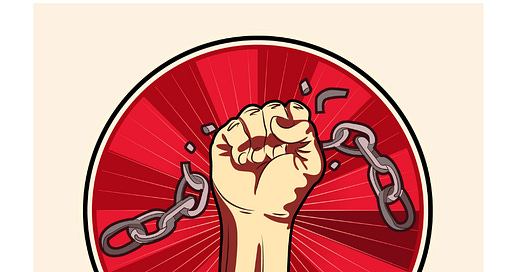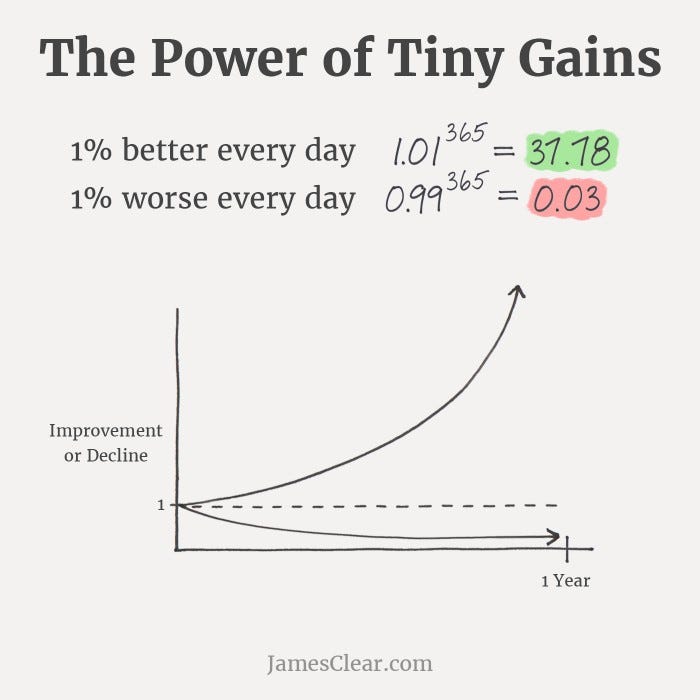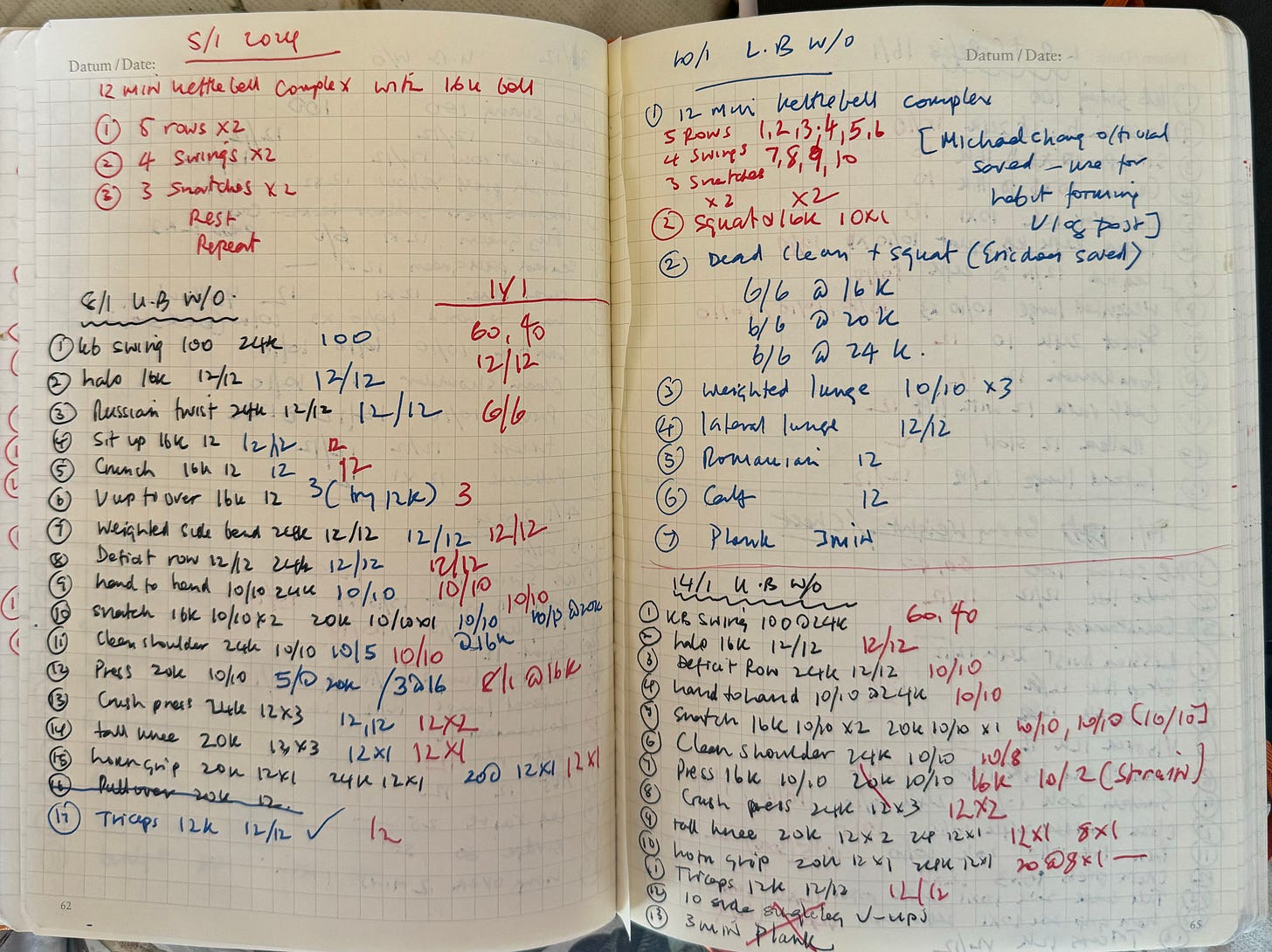Have you ever wondered why some people seem to effortlessly achieve their goals while others struggle to make progress?
The secret lies in the power of habits.
These small, daily actions may seem insignificant on their own, but over time, they shape our lives in profound ways.
Habits are the building blocks of our lives. As James Clear, author of the bestselling book "Atomic Habits," puts it, "You do not rise to the level of your goals. You fall to the level of your systems."
In other words, it's not your grand ambitions that determine your success, but rather the daily habits and routines you follow.
Think about it: your current fitness level, financial situation, relationships, and even your happiness are all largely the result of your habits.
The small decisions you make each day, repeated over months and years, compound to create the life you are living right now.
The Compound Effect: Small Changes, Big Results
One of the most powerful aspects of habits is their ability to compound over time.
This principle, often referred to as the compound effect, is well-known in the world of finance, but it also applies to personal development.
Success doesn't come overnight, but through the accumulation of small, positive actions over time.
Consider this: If you improve by just 1% each day, you'll end up 37 times better by the end of the year.
Conversely, if you decline by 1% each day, you will dwindle down to nearly zero.
This exponential effect is why habits are so crucial.
They set the trajectory for your entire life.
The Dark Side: How Bad Habits Can Derail Your Progress
While good habits can propel you towards success, bad habits can be equally powerful in the opposite direction.
These destructive patterns often develop unconsciously and can be challenging to break. As I have written elsewhere, you become what you meditate on.
If you spend a lot of your day being distracted by negative or scattered thoughts or indeed thoughts that are not aligned with your goals, that is the person you will become, irrespective or your hopes and dreams.
Cal Newport, the author of "Deep Work," warns about the dangers of distraction in our modern world.
He argues that our habit of being constantly connected and multitasking erodes our ability to focus deeply. Deep focus is crucial for producing high-quality work and achieving personal satisfaction.
Bad habits such as procrastination, negative self-talk, or unhealthy eating can gradually erode your goals and well-being.
The insidious nature of these habits lies in their immediate gratification coupled with long-term negative consequences.
The Habit Formation Process: Understanding How Habits Work
To harness the power of habits, it is essential to understand how they form. James Clear breaks down the habit loop into four stages: cue, craving, response, and reward.
Cue: The trigger that initiates the behaviour.
Craving: The motivation or desire for change.
Response: The actual habit or behaviour.
Reward: The benefit you gain from the behaviour.
By understanding this loop, you can begin to identify the cues and rewards that drive your habits, both good and bad.
This awareness is the first step toward changing your behaviour.
The Neuroscience of Habits
Recent neuroscience research has shed light on why habits are so powerful. When we perform a habit, it activates a part of our brain called the basal ganglia, which allows us to perform the action without much conscious thought.
This explains why habits can seem automatic and why they are so difficult to break once they are established.
Understanding this neurological basis can help us be more patient and persistent in our efforts to form habits. It takes time for these neural pathways to form, but once they do, maintaining the habit becomes much easier.
The Role of Identity in Habit Formation
One of the most powerful insights from recent habit research is the importance of identity. As James Clear puts it, "The ultimate form of intrinsic motivation is when a habit becomes part of your identity."
Instead of solely focusing on outcome-based habits (e.g., "I want to lose weight"), consider adopting identity-based habits (e.g., "I want to be a healthy person"). When you align your habits with your identity, they become significantly more potent and enduring.
Strategies for Developing Good Habits
Now that we understand the importance of habits and how they work, let's explore some strategies for developing good habits:
1. Start Small: One of the biggest mistakes people make when trying to form new habits is attempting too much too soon.
Instead, focus on making your new habit so small that it's almost impossible to fail.
Want to start exercising? Begin with just one push-up a day.
The key is to establish the habit first, then gradually increase the difficulty.
When I began kettlebell training, all I did was twenty kettlebell swings with a relatively light 12kg kettlebell, five days a week.
Once I mastered this, I gradually increased the number of swings to 50, then 75, and finally 100.
Once I reached that goal, I increased the weight to 16 kg and started again with 20 swings five days a week. This routine continued, and I am currently doing 100 swings with a 28 kg kettlebell, along with a variety of other kettlebell exercises.
2. Stack Your Habits: Habit stacking, a concept popularised by James Clear, involves linking a new habit to an existing one.
For example, "After I brush my teeth, I will perform deep breathing for one minute."
This strategy leverages the strength of your current habits to build new ones.
This clever idea helps you feel that your day is flowing with purpose, driven by your choices rather than by uncontrollable circumstances.
3. Design Your Environment. Your environment plays a crucial role in shaping your habits. Make good habits obvious and easy, while making bad habits invisible and difficult.
Want to eat healthier? Keep fruits visible on your counter and hide junk food in hard-to-reach places. Or just don’t buy any!
Want to work out regularly? Have a go-to setup available at home that requires little or no resistance to starting immediately, instead of having to travel by car to a gym.
It's about being efficient with your time and reducing barriers to access.
4. Use the Two-Minute Rule: When starting a new habit, ensure it takes less than two minutes to complete. The concept is to make the habit so simple that you cannot refuse to do it.
As time progresses, you can build upon these two-minute habits.
For instance, when it comes to the Kettlebell swing, performing 100 swings only takes around 2.5-3 minutes. Even just 1 minute of deep breathing can have a positive impact.
5. Track Your Progress. Keep a habit tracker or journal to monitor your progress. This not only provides motivation but also makes you more aware of your behaviour patterns. I keep a workout journal.
I plan my practice the night before and then update it as I go through the exercises.
I make notes when I encounter something challenging so that I can make adjustments for the next session.
6. Practice Mindfulness. Mindfulness can help you become more aware of your habits and the cues that trigger them.
Regular meditation, prayer or mindfulness practices can strengthen your ability to make conscious choices rather than acting on autopilot.
I also practice "The Pause" before I start a new task and take 1-minute deep breathing breaks at various points throughout the day.
To help me stay consistent, I set a reminder on my Apple Watch for these breaks, which also logs my Heart Rate Variability (HRV) level during the deep breathing session.
Breaking Bad Habits: A Step-by-Step Approach
Breaking bad habits can be challenging, but it's not impossible. Here's a step-by-step approach:
Identify the Habit: Clearly define the habit you want to change.
Understand Your Triggers: What situations or emotions prompt this habit?
Find a Substitute: Replace the bad habit with a positive or neutral alternative.
Remove Temptations: Modify your environment to make it more difficult to engage in the bad habit.
Visualise Success: Imagine yourself successfully overcoming the habit.
Practice Self-Understanding: Be kind to yourself when you slip up. It's part of the process.
Celebrate Small Wins: Acknowledge and reward your progress, no matter how small.
The Importance of Systems Over Goals
While goals are important for providing direction, it's the systems you put in place that determine your success.
Cal Newport emphasises the importance of "deep work" systems – routines and rituals that enable sustained and focused effort.
Instead of fixating on a specific goal, focus on creating systems that make success almost inevitable.
For example, instead of setting a goal to write a book, establish a system where you consistently write 500 words every day, regardless of circumstances.
The Power of Keystone Habits
Some habits have the power to spark chain reactions that help other good habits take hold. These are called keystone habits.
Regular exercise, for example, often results in healthier eating habits, better sleep, and increased productivity.
This certainly worked for me. My focus 18 months ago was to quickly develop a healthier lifestyle.
So, my new habits, such as resistance training, walking, and better nutrition, worked together to help me break my bad habit of daily red wine consumption.
My goal was not just to remove a bad habit.
Instead, I decided to cultivate new, positive habits that would support each other, leading to genuine and lasting success through the multiplier effect.
The combined new keystone habits are far more powerful than the old habit of drinking alcohol to feel “relaxed”.
So, identify and focus on keystone habits that will help create a positive domino effect in your life, leading to improvements across multiple areas.
Habit Formation in the Digital Age
In our increasingly digital world, technology can be both a help and a hindrance when it comes to habits. On one hand, apps and tech devices can track our habits and provide helpful reminders.
I often mention that I'm a big fan of the Apple Watch and Whoop band. I use many apps, but I'm also mindful of the importance of staying in control and not getting trapped in a digital world.
Cal Newport advocates for "digital minimalism” - being intentional about our technology use to ensure it supports rather than detracts from our goals and values.
Frankly, this is sound advice for most endeavors.
Common Mistakes
Here are some of the most common mistakes people make when trying to build new habits:
Trying to change too many things at once can be overwhelming. I recommend focusing on changing only one or a very small number of habits at a time, rather than attempting to overhaul multiple areas of your life simultaneously. As noted above, just one new keystone habit can result in a positive domino effect.
Setting unrealistic or overly ambitious goals. Starting with habits that are too big or demanding often leads to failure. It's better to start small and gradually increase. For example, don't go for the heaviest weight when lifting. Choose a more manageable one and focus on getting the correct form first.
Focusing on the outcome rather than the process can be demotivating. Getting fixated on achieving a specific goal can lead to frustration when results don't come quickly. Instead, focus on consistently following the habit-building process. The journey itself is a goal.
Lacking consistency and giving up too easily. Habits take time to form, so it's important to stick with them even when motivation wanes. Skipping days or quitting after small setbacks is a common pitfall. It's okay to miss now and then, but you need to ensure that "missing" doesn't itself become a habit.
Not tracking progress or measuring success. Failing to monitor your habit-building efforts makes it harder to stay accountable and see improvements over time. That’s one reason I have a training journal.
Neglecting the significance of your environment. Not setting up your surroundings to support your new habit can make it much harder to stick to. Which is why I train at home and use the gym infrequently.
Assuming small changes don't matter. Many people underestimate the power of small, consistent actions compounding over time.
Not celebrating small wins along the way. Failing to acknowledge progress, even if it seems minor, can reduce motivation to continue.
Starting from scratch instead of learning from others' experiences can lead to repeating common mistakes. Not leveraging existing knowledge about habit formation is a mistake.
Conclusion: The Habit Journey
Developing good habits and breaking bad ones is a lifelong journey.
It's not about perfection, but about continuous improvement.
You don't have to be a product of your environment; you can be the creator of it.
Focus on creating new sustainable habits that will work together to overcome bad choices.
Make your habits work for you, not against you.
Start small, be consistent, and watch as these small changes compound over time to transform your life.
As my wife Helena says, “think big, start small, but start now!”
The habit revolution starts now. Are you ready to join?







